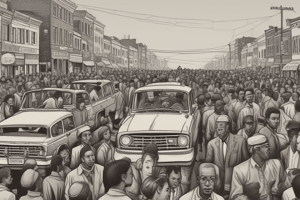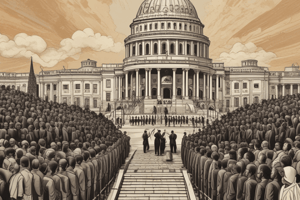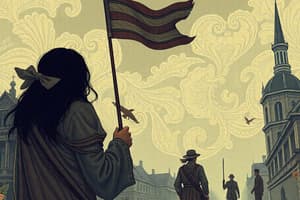Podcast
Questions and Answers
What event is often considered the formal start of the civil rights movement?
What event is often considered the formal start of the civil rights movement?
- Brown v. Board of Education case (correct)
- The March on Washington in 1963
- Rosa Park's act of resistance in 1955
- Signing of the Civil Rights Act of 1964
Which event brought Martin Luther King Jr. into the national spotlight as a charismatic leader?
Which event brought Martin Luther King Jr. into the national spotlight as a charismatic leader?
- The March on Washington in 1963
- Rosa Parks' act of resistance in 1955 (correct)
- Signing of the Voting Rights Act of 1965
- Brown v. Board of Education case
What did President Lyndon Johnson sign to desegregate businesses and government employment?
What did President Lyndon Johnson sign to desegregate businesses and government employment?
- Rosa Parks' act of resistance in 1955
- Voting Rights Act of 1965
- The March on Washington in 1963
- Civil Rights Act of 1964 (correct)
What was the main purpose of the Voting Rights Act of 1965?
What was the main purpose of the Voting Rights Act of 1965?
Which event gathered 200,000 people rallying for civil rights and led to a famous speech by Martin Luther King Jr.?
Which event gathered 200,000 people rallying for civil rights and led to a famous speech by Martin Luther King Jr.?
Flashcards are hidden until you start studying
Study Notes
- African Americans fought for basic rights even after the Civil War, with the modern civil rights movement securing significant progress in the mid-20th century.
- The formal civil rights movement is often dated back to the Brown v. Board of Education case, which ignited national fervor for change.
- Rosa Parks' act of resistance in 1955 by refusing to give up her seat on a bus triggered a bus boycott and brought Martin Luther King Jr. into the spotlight as a charismatic leader.
- The iconic March on Washington in 1963, led by Martin Luther King Jr., gathered 200,000 people rallying for civil rights and culminated in his famous "I Have a Dream" speech.
- Key legislative victories followed, with President Lyndon Johnson signing the Civil Rights Act of 1964 to desegregate businesses and government employment, and the Voting Rights Act of 1965 to ensure African Americans' voting rights.
Studying That Suits You
Use AI to generate personalized quizzes and flashcards to suit your learning preferences.




